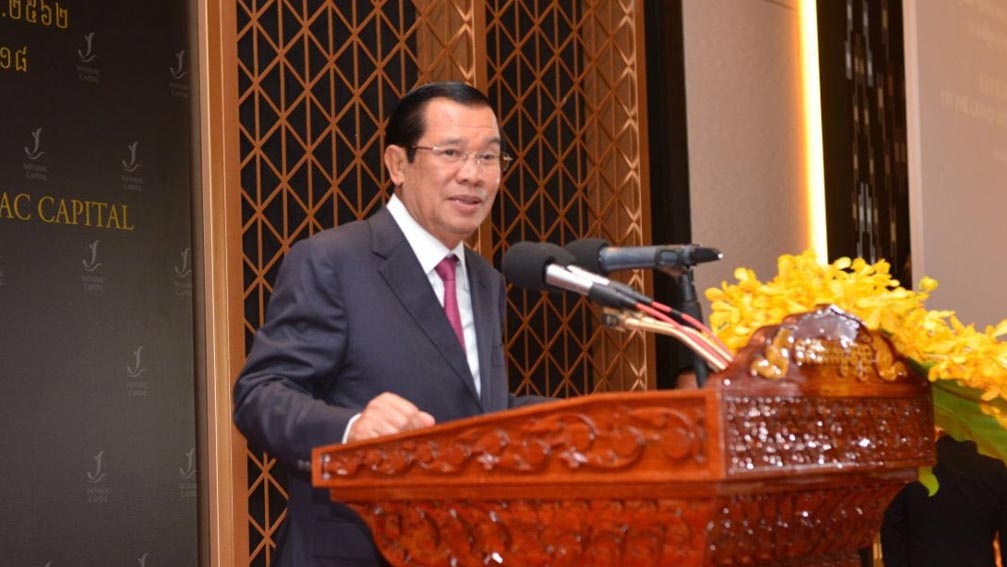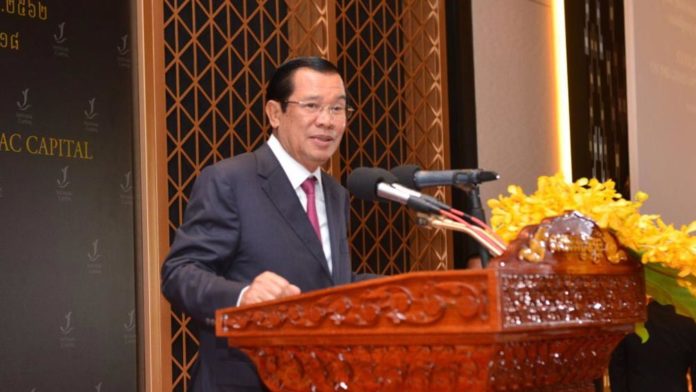The Present Cambodia
My wife and I are so happy to be with all of you to put into official use the Vattanac Capital Tower and the Rosewood Hotel. My wife and I joined Oknha Sam Ang to cut the ribbon in inaugurating these two iconic structures already. I am so proud to have seen that these achievements finally came into being. I thank Lok Chumteav Khhun Leang for reminding us about the hard time that Cambodia went through. To be frank, I also did not know that Cambodia as a whole and Phnom Penh in particular have achieved this level of development. I said on numerous occasions that when I first set foot in Phnom Penh, I met only about 70 people and it was not that easy to lead a country out of war devastation and destruction caused by precedent regimes in addition to unjust blockade from outside […]
Preventing Pol Pot from Returning, Keeping State of Cambodia’s Achievements
Lok Chumteav Chhun Leang reminded that in 1993 there was a complete change to political and economic achievements. I should affirm that the objectives set out by the State of Cambodia (SoC) under my leadership was to seek political settlement, to prevent the regime of Pol Pot from returning to power, and to keep national achievements. Were there no certain assurance of preventing the return of Pol Pot’s regime and of guaranteeing national achievements that we had scored with difficulties, we would not sign the Paris Peace Agreement. We were confident that we had the ability to prevent the regime of Pol Pot and to maintain our hard-won achievements […]
Reform and Development Based on SoC Economic Paradigm
In 1993, after the general elections, the National Assembly adopted a Constitutional monarchy, and liberal pluralistic and democratic regime. That was a political change, However, they were not about to take away those (economic) achievements and administrative system that the State of Cambodia had laid out. It was just a change of way of addressing institutions and civil servants […] economically there was no changes. Reform and development resumed based on existing economic condition and structure. Take for instance, the Vattanac as a company came to existence not after 1993 but under the State of Cambodia. I think we should make this point. It started as a small company in our young private sector then […]
Private Sector Broke Through Embargo
I have the need to remind you that Cambodia was entirely under embargo. This small and pitiful country received helps only from Laos and Vietnam. We had some assistance from India, the biggest democratic country in Asia, after the late Madame Indira Gandhi won elections in 1980 and she recognized our government in 1981. Beyond there, we had the assistances from the former Soviet Union and former CMEA countries. Though smothered by the blockade, we did not die. I had used private sector to break through the embargo to establish trade relation and to attract foreign investments. In those days, countries that made noise about embargo on also traded with Cambodia […] we tried to stand up. They submerged us. We did not succumb to death. We knew that should we let Pol Pot to return, our country would be in graver danger […]
Reform Started, Centrally Planned and Free Market Economies Go Together
… Prior to reaching our goal of the Paris Peace Agreement, we had to introduce a new step of reform commencing from centrally planned economy. Under my premiership, I conducted reforms, and led a transitional period from planned the centrally economy to the market economy. We saw and allowed complementary roles between the two. Our foreign friends present in Cambodia at the time and entrepreneurs could have remembered that I allowed private sector to resume its role in the country’s economy […]
Back then, in Moscow, they never allowed me to meet Leonid Brezhnev or Mikhail Gorbachev with other delegations from what they called socialist countries. They placed me in a group of developing countries such as Angola, Mozambique, and Nicaragua, for instance. They classified me a man of free world […] when I travelled to Paris in 1982 and again in 1984 to prepare for negotiations between Samdech Preah Norodom Sihanouk and me, at the time when Claude Cheysson was French foreign minister, they called me a communist […]
Punishing the Poor
Who am I truly? My belief was that I proudly represented a human race and I did not care whatever they called me. That was not my concern. I knew that I was Hun Sen, a true one. I am proud that our people have joined me in standing up in time of difficulties. Looking into history of the Vattanac Company that together with their shareholders invests 250 million USD (in this tower and hotel), if I am not mistaken, they have up to billion USD in their investments […] our journey for the country and people had been a completely different one compared to other countries.
In the countries, when a political party stopped and power transferred to a new one, the new government would resume based on existing material and technological base. We started with bare hands under pressures of unsurmountable consequences left from the regime of Pol Pot and wars, and the fact that war was still on, in addition to being isolated. The most painful experience was Pol Pot continued to occupy the Cambodian seat at the United Nations for over ten years, while victims of the regime received no empathy. It was not a mistake that Ms Eva (Mysliwiec), representative of Oxfam working in Cambodia then, and Onesta (Carpene) wrote a book about us – Punishing the Poor.
Attached With Every Stage of Development
… We did not have currency. We started from bartering […] my pride now is that I have stayed attached to every stage of development in Cambodia. I did not have inheritance from any one prosperous phase of the country. I traded my life for the country’s liberation from the regime of Pol Pot. In a few days to come, we will celebrate the 41st anniversary of the day that I chose to seek for way to liberate the country […]
Three Major Challenges to Starting Reforms
I was determined to conduct reform and I had to face up three challenges. Firstly, there was lack of understanding about the need for negotiation and free market economy internally. It could be disastrous to Hun Sen’s life. Internally, there was a lack of understanding and there was this thought of keeping up the fighting without political settlement. I never believed that a war would end a war. I had to seek for negotiation […]
Secondly, the Vietnamese troops were still in Cambodia. They were in Cambodia to pursue their roles of protecting the people of Cambodia from Pol Pot and to prevent them from returning. Fortunately, Vietnam never put pressure on us about political decisions. Vietnam did not introduce Doi Moi yet, but Cambodia had already prepared itself for market economy. Vietnam respected our sovereignty and our decisions to take up political and economic reforms […]
Thirdly, our main source of assistance was only from the former Soviet Union and eastern European countries – CMEA. The Soviet Union had not started Perestroika yet. Should there be pressure from the former Soviet Union on Cambodia, it could have been an obstacle for me. Let alone, (we were worried of being a pawn) in powerful countries’ negotiation […]
Better Off People Should Consider Helicopter for Means of Transport
… It is a good thing that people who have become rich and never forget where their journeys were from. I am grateful that Lok Chumteav Chhun Leang reminded us […] as of this time, since you have become rich, I think you should spend some on purchasing own helicopters for long travel. I am raising this matter up because it will save time on journeys to distant provinces. When the country is in emergency of flood or in need for other types of interventions, the Royal Government would ask for those helicopters to help in our emergency actions […] you may need to ask our air force to take care of them and to train you to fly them. This would offer jobs for people, and help your businesses […]
VCT – World Class Tower
… We need to attract more investments and expect more from local investors. I wanted everyone to make use of the opportune moments that peace has brought us. We lost peace dozens or hundreds of years. With lasting peace, we must continue to develop our country. We are calling in foreign investments. We observe no discrimination between local and foreign investors […] I hope the Vattanac Group continue to advance with other companies in the country. We have up to this moment tens of thousands of enterprises in the whole country. Take this Vattanac group, it offers jobs for some twenty thousand people, especially our young people […]./.






